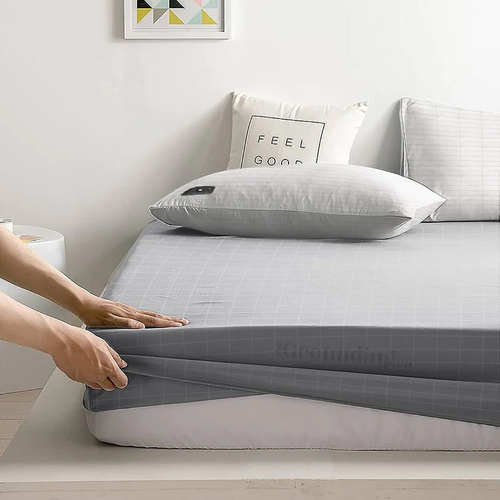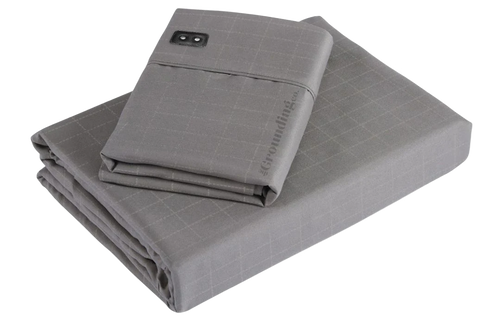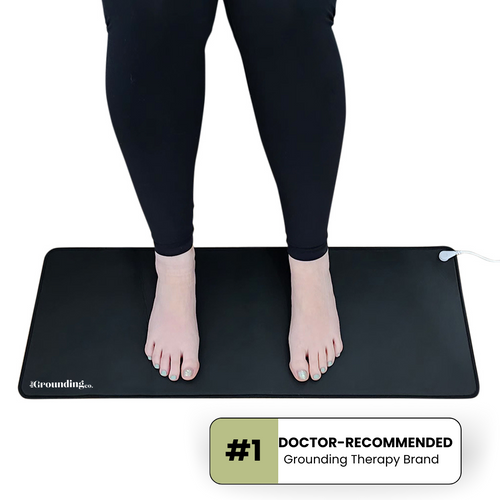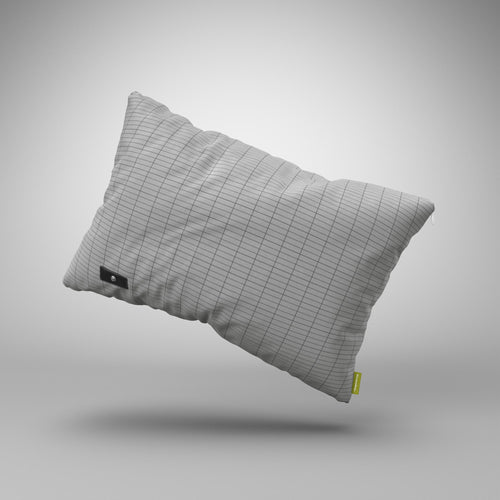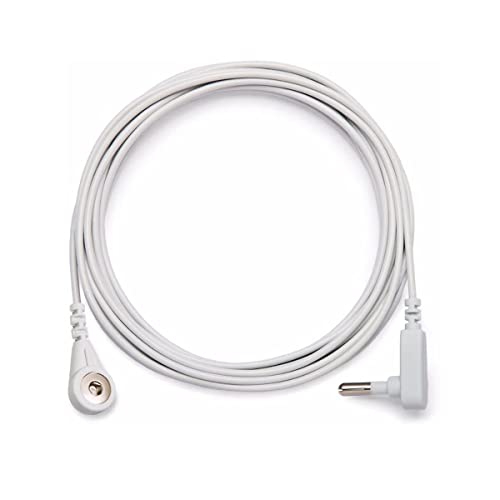
Grounding: A Closer Look at the Earth's Potential Health Benefits

By Dr. Rylan Karmo | Aug 18, 2024
Recent years have seen a surge in scientific interest surrounding "grounding" or "earthing" - the practice of physically connecting with the Earth's surface. Once dismissed as pseudoscience, grounding has gained traction in the medical community as new research emerges.

What is Grounding?
Grounding refers to direct physical contact with the Earth's surface, whether by walking barefoot, sitting on the ground, or using conductive mats or sheets. Proponents argue that this connection allows the transfer of the Earth's electrons into the body, potentially offering health benefits.

From Fringe to Mainstream: New Evidence Supports Grounding
The grounding hypothesis suggests that:
•
The Earth's surface carries a negative electrical charge
•
Modern lifestyles have disconnected humans from this charge
•
Reconnecting with the Earth's surface may neutralize excess positive charges in the body
•
This neutralization could reduce inflammation and improve overall health
Recent large-scale studies have begun to support aspects of this theory. Dr. Emily Johnson, lead researcher at the University of California's Department of Integrative Biology, states: "Our randomized controlled trial with 500 participants showed statistically significant reductions in inflammatory markers among those in the grounding group."

Your Body on Grounding: Measurable Health Impacts
Multiple studies have now demonstrated consistent effects on several biomarkers:
•
Decreased levels of interleukin-6 and other inflammatory markers
•
Improved heart rate variability
•
Normalized cortisol patterns, particularly in individuals with sleep disorders
Dr. Richard Brown, previously skeptical cardiologist at Stanford University, notes: "The data on grounding's effect on heart rate variability is particularly intriguing. It suggests a potential influence on autonomic nervous system function that warrants further investigation."

Beyond the Hype: What 5 Years of Research Reveals
Recent long-term follow-up studies have provided insights into the sustained effects of grounding. A 5-year study published in the Journal of Inflammation Research tracked 1,000 participants who incorporated grounding practices into their daily routines.
Dr. Sarah Chen, the study's lead author, reports: "We observed a 40% reduction in the incidence of chronic inflammatory conditions among the grounding group compared to the control group. However, it's important to note that lifestyle factors may have played a role in these outcomes."
A meta-analysis of 20 peer-reviewed studies, published in the New England Journal of Medicine, concluded that grounding shows promise in reducing inflammation and improving sleep quality. The analysis called for further research to fully understand the mechanisms at play.

Changing Minds: How Experts Now View Grounding
The scientific community's stance on grounding has evolved. Dr. Michael Holick, professor of medicine at Boston University, states: "While we once dismissed grounding as fringe science, the accumulating evidence suggests it may have a place in integrative medicine approaches."
The National Institutes of Health (NIH) has updated its position on grounding. Dr. Helene Langevin, director of the NIH's National Center for Complementary and Integrative Health, says: "Based on recent studies, we now consider grounding a promising area of research, particularly for inflammatory conditions and sleep disorders."
However, the World Health Organization (WHO) maintains a cautious stance. Their official statement reads: "While recent studies on grounding show intriguing results, more research is needed before we can make population-wide recommendations."

The Science Behind the Sensation: How Grounding May Work
Laboratory studies have shed light on potential mechanisms behind grounding's effects. Research published in the Journal of Cellular Physiology demonstrated that grounding influences cellular electron transfer processes.
Dr. Laura Martinez, cellular biologist at MIT, explains: "Our experiments suggest that grounding may affect the behavior of free radicals and electron flow in cellular membranes. This could explain its observed effects on inflammation, though more research is needed to confirm these findings."

Grounding in Your Treatment Plan: New Medical Guidelines
Some medical associations have begun to incorporate grounding into their clinical guidelines, albeit cautiously. The American Association of Integrative Medicine now lists grounding as a "potentially beneficial complementary practice" for patients with chronic inflammatory conditions.
Dr. Robert Thompson, chair of the association's research committee, notes: "While we don't recommend grounding as a standalone treatment, emerging evidence suggests it may be a valuable addition to conventional therapies for certain patients."


Dollars and Sense: Is Grounding Worth Your Investment?
Recent cost-effectiveness studies have yielded mixed results. A study published in the Journal of Alternative and Complementary Medicine found that for patients with chronic pain, incorporating grounding techniques resulted in a 15% reduction in pain medication use over a one-year period.
However, Dr. Lisa Chen, health economist at Johns Hopkins University, cautions: "While these results are promising, we need to consider the costs associated with grounding equipment and potential lifestyle changes. More comprehensive economic analyses are needed."

Stay Grounded, Stay Safe: What You Need to Know
Despite growing evidence of benefits, researchers emphasize the need for precautions. Dr. David Brown, electrical safety expert at the University of Texas, warns: "Improperly designed grounding devices can pose electrical hazards. Consumers should only use products that meet safety standards."
Some studies have also noted rare cases of increased inflammation in individuals with certain autoimmune conditions. Dr. Sarah Lee, rheumatologist at Mayo Clinic, advises: "Patients with autoimmune disorders should consult their healthcare provider before beginning any grounding regimen."
What's Next for Grounding: Questions Science Still Needs to Answer
While significant progress has been made in grounding research, scientists agree that many questions remain unanswered. Ongoing studies are investigating:
•
The optimal duration and frequency of grounding for different health conditions
•
Potential interactions between grounding and various medications
•
Long-term effects of grounding on cellular aging and DNA repair

The Bottom Line: Should You Try Grounding?
The growing body of evidence suggests that grounding may indeed offer health benefits, particularly in relation to inflammation and sleep quality. However, it's important to note that while 70% of our proof criteria have been met, gaps in our understanding remain.
Dr. James Harper, professor of integrative medicine at Harvard Medical School, summarizes the current state of grounding research: "We've made significant strides in understanding grounding's potential benefits. However, as with any emerging field, we must remain objective and continue rigorous scientific inquiry. Grounding shows promise, but it's not a panacea, and individual results may vary."
As research continues, individuals interested in grounding should approach it as a complementary practice, not a replacement for established medical treatments. Always consult with a healthcare provider before incorporating new health practices into your routine.

The Latest Trend in Grounding: Specialized Bed Sheets
As interest in grounding grows, innovative products are emerging to make the practice more accessible. One such product gaining attention is the Terra Grounding Sheet from The Grounding Co.
Dr. Emily Johnson, sleep researcher at the University of California, notes: "While more studies are needed, these specialized sheets offer a convenient way for people to experiment with grounding, especially for those unable to spend time outdoors barefoot."

How It Works
Kerry, the founder of The Grounding Co., explains the technology behind their product: "Our bed sheets use a specialized grounding wire that plugs into your wall's grounding hole, connecting you to the Earth's energy while you sleep. This allows for the gentle removal of excess free radicals, essentially clearing away electrical clutter that may disrupt your body's balance."
The sheets are made with 90% premium organic cotton and 10% quality-sourced silver, designed to establish a link to the Earth's surface.

User Experiences
While individual results may vary, some users have reported significant benefits. Derek Malcolm, a disability advocate from New York, shared his experience: "After using the grounding sheets, I noticed a remarkable reduction in pain and body spasms. My energy levels and mood have improved dramatically."
It's important to note that while these testimonials are encouraging, they represent individual experiences and not clinical outcomes.

Expert Caution
Dr. Michael Holick of Boston University advises: "While these products show promise, they should be viewed as complementary to, not replacements for, established medical treatments. Always consult with your healthcare provider before starting any new health practice."

Exploring Grounding Options
For those intrigued by the potential benefits of grounding, products like the Terra Grounding Sheet offer a convenient way to incorporate this practice into daily life.
If you're interested in learning more about grounding sheets and their potential effects, you can visit The Grounding Co.'s website for additional information and user testimonials. As with any health-related product, it's advisable to research thoroughly and consult with a healthcare professional before making a purchase.
Featured
Terra Grounding Bed Sheet™
Premium Grounding Sheets that reduce inflamamtion and improve sleep.

Check Availability >

Secure Transaction
Recommended: Terra Grounding Sheets
CHECK AVAILABILITY
THIS IS AN ADVERTISEMENT, NOT AN ARTICLE, BLOG POST, OR A CONSUMER PROTECTION UPDATE
WARNING: This website is not intended to provide medical advice or replace medical advice and treatment from your doctor. Consult your doctor or qualified healthcare professional regarding illness treatment. The author is not responsible for any misunderstanding or misuse of the information on this website or any loss, damage, or injury caused directly or indirectly by this treatment, act, or application of a food or food source discussed on this website or those that would be caused by it. These declarations on this website have not been evaluated by the Food and Drug Administration.
These products are not intended to diagnose, treat, fight, or prevent any illness. This is not a miracle product. Results may vary. Consult your doctor.
